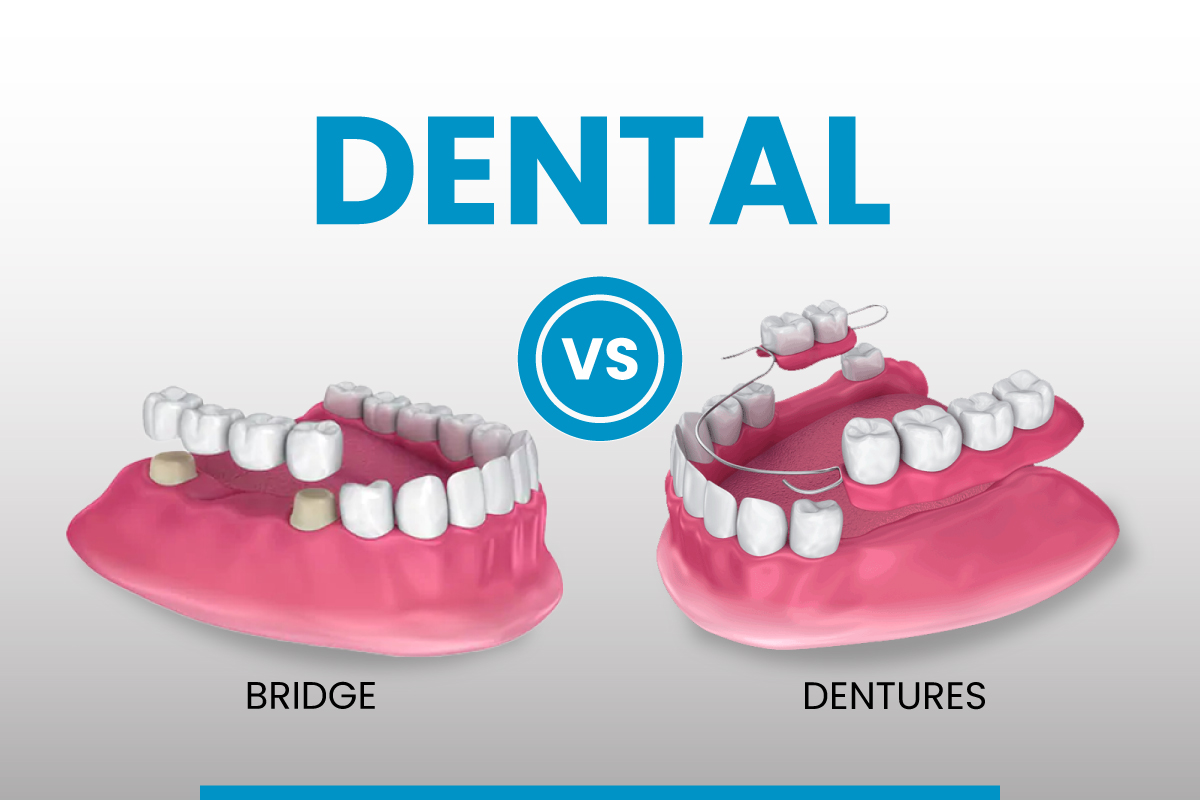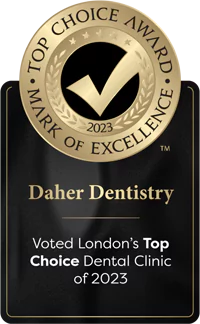Do Dental Bridges Prove to Be More Effective Than Dentures?
Dental bridges and dentures are both dental restorative procedures that help people fill up the gaps left by missing teeth and enable them to avoid various potential diseases that could be caused by empty spaces left due to lost teeth, such as tooth decay or gum-related problems. Due to the recent advancements and progress in dentistry, people can now choose from a variety of options.
A dental bridge is typically a set of porcelain teeth, also called points, that attach to the crowns adhered to the abutment teeth on either side of the gap. On the other hand, dentures are removable prosthetic devices that can be attached to the gums and removed when needed. There are generally two types of dentures that people commonly choose, i.e., partial dentures and a complete set of dentures.
Material of Dental Bridges:
Dental bridges are available in various materials, like porcelain, ceramic, zirconium, and composite. Each comes with advantages and drawbacks, but a dental bridge made from dental-grade porcelain, or a blend of porcelain and zirconium is considered to be the most durable and safest choice. These metal-free bridges give your smile a natural, realistic look while offering a high degree of durability and strength.
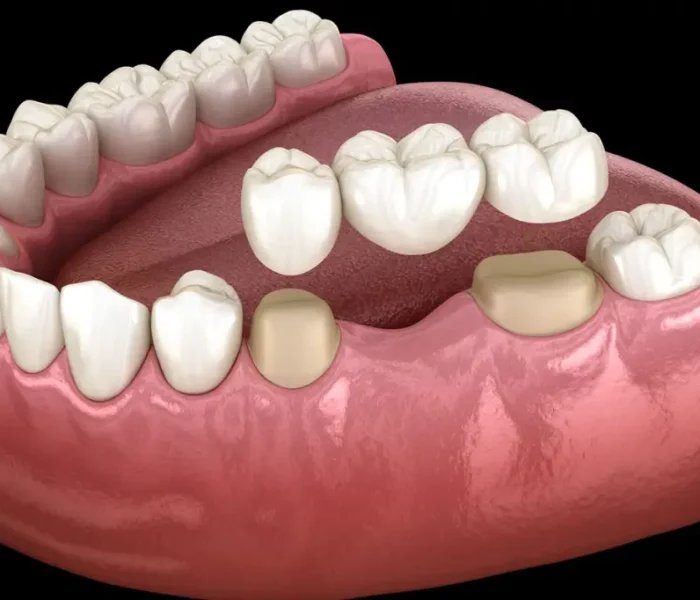
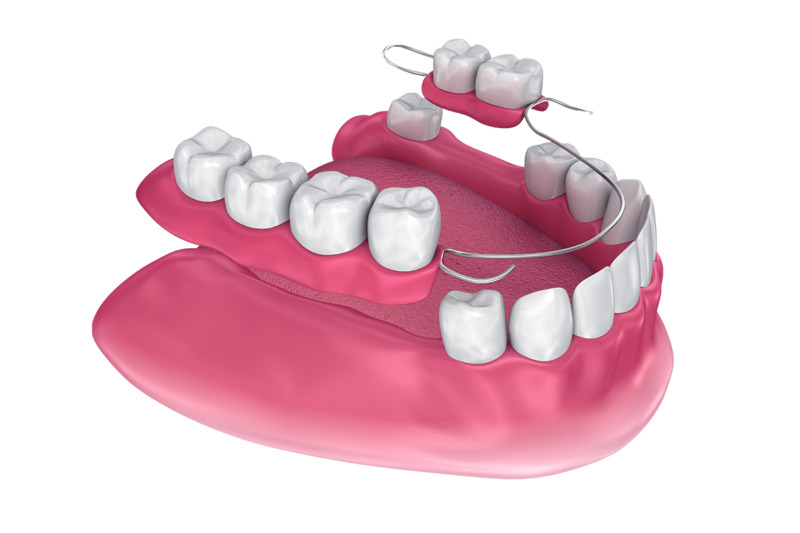
Material of Dentures:
Dentures are usually manufactured from acrylic resin (a type of plastic), composite resin, and porcelain. In the past, dentures made from porcelain were preferred because they were more aesthetic. However, today acrylic resin has become more common and is the highest on-demand material for dentures. It fixes perfectly into the desired space, is the easiest material to adjust, and is more comfortable for patients.
Factors To Consider While Choosing Between Dental Bridges And Dentures
- Number of Missing Teeth
- Cost
- Experience
- Replacement
1. Number of Missing Teeth:
If one has multiple missing teeth, getting dental bridges for each tooth would be an impractical choice. In such cases, dentures are the best pick. But if a person has 3 to 4 missing teeth in a row, then a dental bridge could be a suitable choice. A person with strong and healthy adjacent teeth and good bone support can be a candidate for getting bridges.
2. Cost:
Dentures are considered to be the cheapest dental restorative procedure. Generally, dentures would cost you around $300 to $500. Moreover, if a person wants to get a complete set of dentures (upper and lower), it would cost no more than $1000. On the other hand, a bridge with one pontic and two crowns would cost around $2,000 and $5,000, Which indicates that dentures will be an ideal choice if someone is on a limited budget.
3. Experience:
Dental bridges usually provide a more comfortable and better fit and feel closer to natural teeth. On the other hand, dentures can sometimes become a reason for mouth sores, receding gums, bone loss and alteration in the face frame and sometimes cause difficulty in eating and talking because of unwanted sliding.
Dentures can also break easily. That’s why bridges are a better option than dentures if a person is looking for a fixed dental alternative that would impart a better experience. However, bridges require regular maintenance to prevent gum diseases, and the surface under the bridge needs to be cleaned daily.
4. Replacement:
With proper care and good oral hygiene routines, dentures can last up to 7 years, and after this time period, a new set of dentures will be fabricated for you. On the other hand, a dental bridge proves to be more long-lasting and durable and needs to be replaced after more than 10 years.
Which Is Right for You?
In the selection of the right option for you, your dentist will assess your oral health and then will let you know which type of tooth replacement would be best for you. Dentists in London Ontario usually consider the extent of the tooth loss and the health of the remaining teeth before recommending a treatment option to patients.
A denture might be a perfect fit for you if:
- You have multiple missing teeth at various places throughout a dental arch.
- You are concerned about the cost of the restorative procedure.
- Your remaining teeth are not strong enough to support a dental bridge.
On the other hand, a dental bridge might be the better choice if:
- You have just a few missing teeth from a single area of your mouth.
- You want a secure dental restorative option that provides a strong bite force.
- Your original teeth are strong enough to support the bridge.
- You want your artificial teeth to look as natural as possible because a porcelain bridge is almost indistinguishable from natural teeth.
Both bridges and partial dentures are good tooth replacement options but are dependent on your oral health and other unique circumstances. However, dentures can break easily; that’s why bridges are a better option than dentures. But bridges need regular maintenance and good oral hygiene routines to prevent gum diseases.
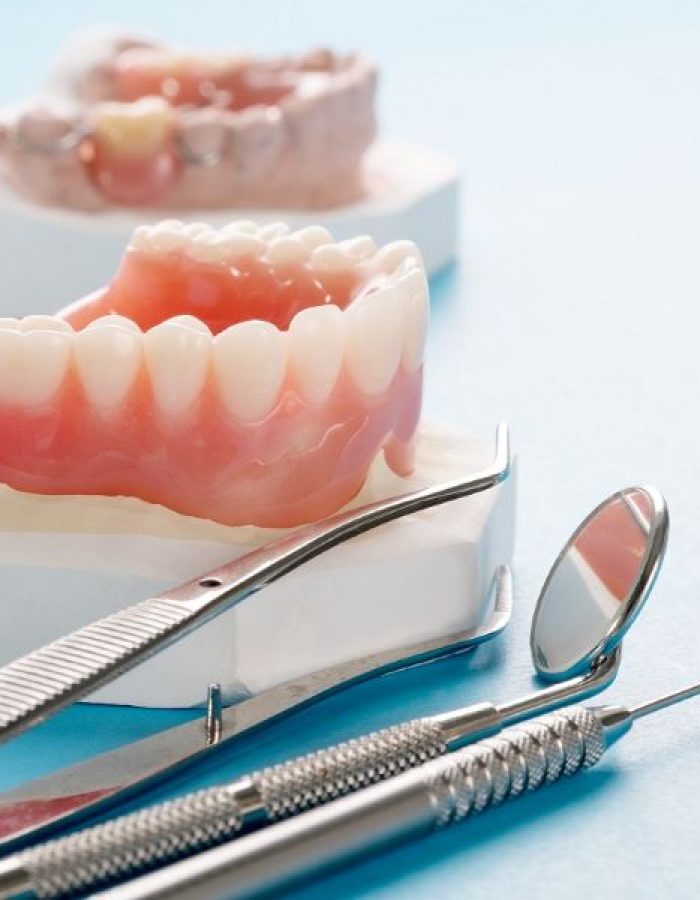
Frequently Asked Questions
A dental bridge is a fixed (permanent) dental restorative option, whereas partial dentures are removable; one can take them off and place them back according to their convenience. Moreover, a dental bridge usually requires tooth extraction to prepare your mouth before the bridge is fitted, but in the case of dentures, people do not have to worry about any kind of alterations as they are fabricated to fit your mouth shape.
Dental bridges usually replace one to four missing teeth, depending on the patient’s oral health. However, generally, people choose to replace one or two teeth with bridges. But, in rare cases, one can also have four teeth replaced with a dental bridge, especially if a person has sufficient healthy teeth present in the mouth in order to provide an anchor to dental crowns.
Whereas dentures can cover the entire row of missing or extracted teeth and has a minimal functional number of up to 20 teeth. Sometimes dentures can also cover up to 28 teeth to provide proper support for a healthy bite.
Whereas dentures can cover the entire row of missing or extracted teeth and has a minimal functional number of up to 20 teeth. Sometimes dentures can also cover up to 28 teeth to provide proper support for a healthy bite.

